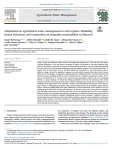El Fartassi I., Metcalfe H., El Alami R., Diarra A., Alonso-Chavez V., Waine T.W., Zawadzka J., Milne A.E., Corstanje R. (2025). Adaptations in agricultural water management in arid regions: Modelling farmer behaviour and cooperation on irrigation sustainability in Morocco. Agricultural Water Management, 01/10/2025, vol. 319, p. 109789.
https://doi.org/10.1016/j.agwat.2025.109789
https://doi.org/10.1016/j.agwat.2025.109789
| Titre : | Adaptations in agricultural water management in arid regions: Modelling farmer behaviour and cooperation on irrigation sustainability in Morocco (2025) |
| Auteurs : | I. El Fartassi ; H. Metcalfe ; R. El Alami ; A. Diarra ; V. Alonso-Chavez ; T.W. Waine ; J. Zawadzka ; A.E. Milne ; R. Corstanje |
| Type de document : | Article |
| Dans : | Agricultural Water Management (vol. 319, October 2025) |
| Article en page(s) : | p. 109789 |
| Langues : | Anglais |
| Langues du résumé : | Anglais |
| Catégories : |
Catégories principales 07 - ENVIRONNEMENT ; 7.3 - Eau. Gestion de l'EauThésaurus IAMM GESTION DES EAUX ; IRRIGATION ; AGRICULTURE ; ZONE ARIDE ; COMPORTEMENT DES AGRICULTEURS ; MAROC |
| Résumé : | Climate change has disrupted weather patterns and heightened drought risks in arid and semi-arid regions, requiring adaptations to crop and irrigation strategies to sustain food production. This study integrates qualitative and quantitative approaches to examine the factors influencing farmers crop and irrigation management decisions, with a focus on groundwater management and drip irrigation adoption. Semi-structured interviews 70 farmers from Al Haouz Basin, Morocco provided insights into motivations for crop and irrigation choices. Inductive coding was used for qualitative responses, and data analysis examined how farm size and tenure influenced decision-making. An integrated modelling approach combining the theory of planned behaviour and structural equation modelling (SEM) was used to interpret drivers of irrigation management strategy. The interviews revealed that 83 % of farmers were concerned about groundwater decline, with 40 % identifying salinity as a major challenge. We found that falling groundwater levels and soil salinization have already impacted yields and raised concerns about further declines, prompting large-scale farmers to transition to more profitable and drought-resilient olive cultivation. Analysis of the SEM showed that attitudes toward drip irrigation efficiency, maintaining groundwater supply, and preventing increases in groundwater salinity influence farmers' intentions regarding their water usage. Additionally, perceived behavioural control played a key role in shaping adoption behaviours, reinforcing the importance of structural and economic factors in decision-making. Land ownership conferred greater long-term perceived control over sustainable water use. However, qualitative findings revealed that cooperation on groundwater management was limited, with many farmers citing a lack of perceived benefits and logistical challenges, highlighting collective action challenges. Complexities related to subsidy applications and land tenure deter drip irrigation adoption, especially among smallholders, constraining climate change resilience. Our study contributes to understanding farmers' coping strategies and presents a foundation from which to develop evidence-based policy reforms enhancing agricultural and water sustainability across arid and semi-arid regions. |
| Cote : | En ligne |
| URL / DOI : | https://doi.org/10.1016/j.agwat.2025.109789 |







